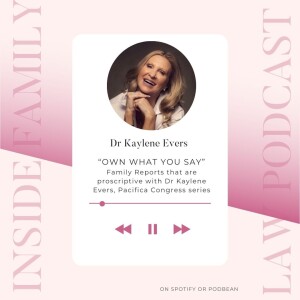
Inside Family Law with Zoë Durand
Education

“own what you say” – Family Reports that are proscriptive with Dr Kaylene Evers, Pacifica Congress series
 2023-10-18
2023-10-18
“own what you say” – Family Reports that are proscriptive with Dr Kaylene Evers, Pacifica Congress series
Dr Kaylene Evers (https://www.kayleneevers.com/)
At the Pacifica Congress Conference live in Hobart 2023 www.pacificacongress.org
The Inside Family Law Podcast is hosted by Zoe Durand at Mediation Answers www.mediationanswers.com.au in partnership with Lawyer Magic and ArtWork.
If you would like to attend the champagne celebration on 1 November 2023 for the Inside Family Law and network with our remarkable guests that we have hosted over the years secure your spot at: https://www.eventbrite.com.au/e/736405357247?aff=oddtdtcreator
- “You need to own what you say… not sit on the fence. Be proscriptive, not descriptive.”
- “observation starts from the first phone call, it doesn’t just occur when someone turns up at your office.”
- “A Judge is looking to our professional experience to assist them.”
- Although it is not the key purpose of a report “a good report can be therapeutic because it might be that if its understood by the participants … they have an epiphany. The penny drops and they might change the way they interact. That’s glorious when that happens.”
- Explaining how we move from observation to recommendations.
- Dynamic movement from hypothesis and testing hypothesis, can include psychometric testing.
- Every child is different and every family is different. You can draw from benchmarks but then need to look at the individual family and child.
- Planning and also flexibility. You have to be flexible and are “constantly reformulating your hypothesis below the surface.”
- It is only a snap shot in time. “How can you extend the snapshot?”
- Zoe asks: How can report writers assess a family in such a narrow time frame/ ie one meeting? (Note Kaylene gives a very thorough answer so listen in!)
- Read all the documents (extends back the time frame)
- Meeting in person is only part of the jigsaw puzzle.
- Clarity and certainty VS flexibility in reports.
- If other new information comes to light (ie on cross examination) that may change your view. “It’s a dynamic process.”
- What are the changes we have seen in reports over the years?
- Kaylene: in the last 5-8 years there are more “fence sitting” reports that do not have clear recommendations.
- Vague reports add to the adversarial process.
- Harder to settle a matter at mediation if report is unclear (Zoe).
- Report writers need to be clear and explain how they got to that recommendation ie join the dots and why they think what they think.
- Perhaps some report writers are concerned about being cross examined. However if they have worked through the reasons for why they think what they think, report writers should not fear cross. It can be an opportunity to explain their reasons and if new information comes to light, help refine what is in the best interests for children.
- This is also why we are here at Pacifica Congress – to learn from each other, have dialogue and focus on what is in the best interests of children.
- Interdisciplinary perspectives.
More Episodes
Create your
podcast in
minutes
- Full-featured podcast site
- Unlimited storage and bandwidth
- Comprehensive podcast stats
- Distribute to Apple Podcasts, Spotify, and more
- Make money with your podcast
It is Free
- Privacy Policy
- Cookie Policy
- Terms of Use
- Consent Preferences
- Copyright © 2015-2024 Podbean.com






